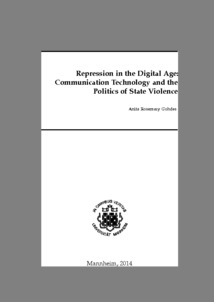|
Repression in the digital age : Communication technology and the politics of state violence
Gohdes, Anita R.
![[img]](https://madoc.bib.uni-mannheim.de/style/images/fileicons/application_pdf.png)  Vorschau |
|
PDF (Dissertation Gohdes)
Gohdes_Anita_Doktorarbeit_Mar2015.pdf
- Veröffentlichte Version
Download (2MB)
|
|
URL:
|
https://madoc.bib.uni-mannheim.de/37902
|
|
URN:
|
urn:nbn:de:bsz:180-madoc-379023
|
|
Dokumenttyp:
|
Dissertation
|
|
Erscheinungsjahr:
|
2014
|
|
Ort der Veröffentlichung:
|
Mannheim
|
|
Hochschule:
|
Universität Mannheim
|
|
Gutachter:
|
Carey, Sabine C.
|
|
Datum der mündl. Prüfung:
|
19 Dezember 2014
|
|
Sprache der Veröffentlichung:
|
Englisch
|
|
Einrichtung:
|
Fakultät für Sozialwissenschaften > Political Scinece, International Relations (Carey 2010-)
|
|
Fachgebiet:
|
300 Sozialwissenschaften, Soziologie, Anthropologie
310 Statistik
320 Politik
|
|
Normierte Schlagwörter (SWD):
|
Bürgerkrieg , Neue Medien , Internet , Repression , Syrien , Menschenrecht
|
|
Freie Schlagwörter (Englisch):
|
Repression , Human Rights , Internet , New Media , Conflict , Political Violence , Syria , Civil War
|
|
Abstract:
|
The effect of the digital revolution on citizens’ ability to voice dissatisfaction with their government and to coordinate dissent via social media has been the subject of much recent research. Optimistic accounts have so far failed to address the salient fact that the state maintains de facto control over the access to social media, which means that new digital technology also provides abusive governments with tools to repress challengers. This dissertation investigates how states’ strategies of violent repression are informed by the use of these opportunities to control the internet.
I identify two main forms of control, which are the restriction or disruption of the internet on the one hand, and digital surveillance on the other hand. States face a trade-off: they can either restrict access to the internet and with it diminish opposition groups’ capabilities, or they can permit the digital exchange of information and monitor it to their own advantage. I argue that the choice of internet control affects the type and scale of state-sanctioned violence used against perceived domestic threats. The choice of digital surveillance as a form of control is likely to be used in conjunction with targeted acts of localised violence against those identified as critical to the future success of opposition movements. The availability of highly specified intelligence on the intentions and location of opposition leaders enables states to use targeted violence.
Where states have chosen to respond to critical domestic threats in the form of censorship, they will also be more likely to visibly demonstrate their authority through a heightened use of violent repression. In addition, censorship severely limits the choices for violent action on the side of the government, by restricting the state’s own access to the required intelligence for selecting precise targets. Consequently, during periods of censorship, state-sanctioned violence is likely to affect the domestic population indiscriminately.
I present a global analysis of the relationship between internet disruptions and the level of state-sanctioned violence, confirming that states who use net- work disruptions are also more likely to abuse the rights of their citizens. Evidence presented in case examples provides contextual understanding for the variety of different digital control tools which states have at their disposal.
The full implications of the theoretical argument are tested by moving to the sub-national level, and investigating the relationship between internet control and state violence, spatially and temporally in the Syrian conflict. I present a new integrated database on incidences of state killing in Syria, as well as disaggregated measures of network accessibility. First, I show that internet shutdowns occur in conjunction with significantly higher levels of state violence, most notably in areas where government forces are actively challenged by opposition groups. Second, I use supervised machine-learning to analyze over 60,000 records of state killings by the Syrian regime, and classify them to distinguish between targeted and untargeted acts of repression. I show that higher levels of internet accessibility are consistently linked to an increase in targeted repression, whereas areas with little or no access to the internet witness more indiscriminate campaigns of violence.
I conclude the dissertation by discussing the implications of the theoretical argument and the results, which have important ramifications for research and policy attempting to limit state abuse in the twenty-first century.
|
|
Zusätzliche Informationen:
|
Vollständiger Name: Gohdes, Anita Rosemary
|
 | Dieser Eintrag ist Teil der Universitätsbibliographie. |
 | Das Dokument wird vom Publikationsserver der Universitätsbibliothek Mannheim bereitgestellt. |
 Suche Autoren in Suche Autoren in
Sie haben einen Fehler gefunden? Teilen Sie uns Ihren Korrekturwunsch bitte hier mit: E-Mail
Actions (login required)
 |
Eintrag anzeigen |
|
